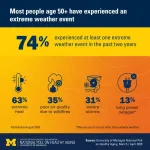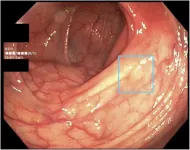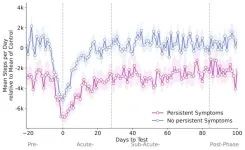(Press-News.org) DALLAS, March 20, 2025 — Stroke is the fourth leading cause of death in India and the fifth leading cause of disability.[1] To establish a coordinated system of care for stroke in the country, Apollo Hospital in Hyderabad, Telangana, and Aster Hospital in Calicut, Kerala, are the first in India to be certified as Comprehensive Stroke Centers by the American Stroke Association.
Launched in India last year, certifications from American Stroke Association, a division of the American Heart Association, devoted to a world of healthier lives for all, recognize hospitals that have the necessary state-of-the-art equipment, infrastructure, staff and training to quickly diagnose and best treat patients with the most complex strokes.
"It is up to us to create a better world for everyone,” said D.P. Suresh, M.D., FAHA, volunteer member of the American Heart Association's International Committee. “The American Heart Association remains committed to reducing the impact of heart disease and stroke for patients everywhere. Using science-based methods for stroke assessment, diagnosis and treatment is essential to improving outcomes—saving lives and lowering the risk of long-term disability."
There are currently two stroke certification classifications available in India: Comprehensive Stroke Center and Primary Stroke Center. Comprehensive Stroke Centers must document rigorous standards and requirements, including advanced imaging and treatment capabilities, 24/7 availability of specialized treatments, participation in research, and staff and physicians with the unique education and competencies to care for complex stroke patients. The Association surveyors determine if a hospital met or exceeded all required standards.
Facilities seeking Primary Stroke Center certification must demonstrate the ability to care for patients with acute ischemic stroke, transfer protocols to a Comprehensive Stroke Center, stroke-specific educational requirements for all disciplines caring for stroke patients, data collection and a robust stroke quality improvement initiative.
In addition to the stroke certifications, the Association is piloting a Comprehensive Chest Pain certification. These certification programs are part of the Association’s efforts to establish, improve and support heart disease and stroke care around the world.
Learn more about the Stroke Center certification at https://international.heart.org/en/international-healthcare-quality/stroke-certification
Additional Resources:
Multimedia is available on the right column of release link.
Enhancing Global Healthcare Standards | International Heart Association | American Heart Association International
Health Lesson: Spot a Stroke F.A.S.T. | EmPOWERED to Serve
###
About the American Heart Association
The American Heart Association is a relentless force for a world of longer, healthier lives. Dedicated to ensuring equitable health in all communities, the organization has been a leading source of health information for more than one hundred years. Supported by more than 35 million volunteers globally, we fund groundbreaking research, advocate for the public’s health, and provide critical resources to save and improve lives affected by cardiovascular disease and stroke. By driving breakthroughs and implementing proven solutions in science, policy, and care, we work tirelessly to advance health and transform lives every day. Connect with us on heart.org, Facebook, X or by calling 1-800-AHA-USA1.
[1] Jones S, Bagai K, Clegg A, Georgiou R, Harris C, et al. Stroke in India: A systematic review of the incidence, prevalence, and case fatality. Int J Stroke. July 2, 2021;17(2):132–140. https://pmc.ncbi.nlm.nih.gov/articles/PMC8821978/
END
First Comprehensive Stroke Centers certified in India
The American Stroke Association awards first Comprehensive Stroke Center certifications in India to Apollo Hospital, Aster Hospital
2025-03-20
ELSE PRESS RELEASES FROM THIS DATE:
Weather emergencies affect older adults’ views on climate and health
2025-03-20
Nearly 3 out of every 4 older Americans have experienced at least one extreme weather event in the last two years, a new University of Michigan poll finds. And living through such an event appears to make a big difference in how they view the potential impact of climate change on their health.
The new findings from the National Poll on Healthy Aging show that 59% of people aged 50 and over are concerned about how climate change could affect their health.
The percentage expressing concern was even higher among those who had recently lived through a weather ...
Graz University of Technology team decodes heat conduction of complex materials
2025-03-20
Complex materials such as organic semiconductors or the microporous metal-organic frameworks known as MOFs are already being used for numerous applications such as OLED displays, solar cells, gas storage and water extraction. Nevertheless, they still harbour a few secrets. One of these has so far been a detailed understanding of how they transport thermal energy. Egbert Zojer’s research team at the Institute of Solid State Physics at Graz University of Technology (TU Graz), in collaboration with colleagues from TU Vienna and the University of Cambridge, has now cracked this ...
Cell atlas of the endometrium in women with PCOS may lead to better treatment
2025-03-20
Women with polycystic ovary syndrome (PCOS) find it harder to get pregnant, have more frequent miscarriages and have a higher risk of developing endometrial cancer. Now, in a new study published in Nature Medicine, Swedish researchers have shown that the uterine lining of these women differs in terms of both the composition of individual cells and gene expression. The results open the door to new drug treatments.
PCOS is the most common hormonal disorder affecting 11-13% of women of reproductive age. Women with the syndrome have difficulty getting pregnant and are at increased ...
New rules for the game of memory
2025-03-20
As animals experience new things, the connections between neurons, called synapses, strengthen or weaken in response to events and the activity they cause in the brain. Neuroscientists believe that synaptic plasticity, as these changes are called, plays an important role in storing memories.
However, the rules governing when and how much synapses change are not well understood. The traditional view is that the more two neurons fire together, the stronger their connection becomes; when they fire separately, their connection weakens.
New research ...
A simple way to control superconductivity
2025-03-20
Scientists from the RIKEN Center for Emergent Matter Science (CEMS) and collaborators have discovered a groundbreaking way to control superconductivity—an essential phenomenon for developing more energy-efficient technologies and quantum computing—by simply twisting atomically thin layers within a layered device. By adjusting the twist angle, they were able to finely tune the “superconducting gap,” which plays a key role in the behavior of these materials. The research was published in Nature Physics.
The superconducting gap is the energy threshold required to break apart Cooper pairs—bound electron pairs that enable superconductivity at low temperatures. ...
New CRISPR tool enables more seamless gene editing — and improved disease modeling
2025-03-20
New Haven, Conn. — Advances in the gene-editing technology known as CRISPR-Cas9 over the past 15 years have yielded important new insights into the roles that specific genes play in many diseases. But to date this technology — which allows scientists to use a “guide” RNA to modify DNA sequences and evaluate the effects — is able to target, delete, replace, or modify only single gene sequences with a single guide RNA and has limited ability to assess multiple genetic changes simultaneously.
Now, however, Yale scientists have developed a series of sophisticated mouse models using CRISPR (“clustered regularly ...
AI technology for colon cancer detection shows promise for widespread use – in the future
2025-03-20
The American Gastroenterological Association (AGA) released a new clinical guideline making no recommendation — for or against — the use of computer-aided detection systems (CADe) in colonoscopy. A rigorous review of evidence showed that artificial intelligence-assisted technology helps identify colorectal polyps. However, its impact on preventing colorectal cancer — the third most common cancer worldwide — remains unclear.
Colonoscopy, performed more than 15 million times annually in the U.S., is an effective tool for detecting and preventing colorectal cancer. CADe systems have been shown to improve polyp detection ...
Researchers identify promising drug candidates for previously “undruggable” cancer target
2025-03-20
For the first time scientists have identified promising drug candidates that bind irreversibly with a notoriously “undruggable” cancer protein target, permanently blocking it.
Transcription factors are proteins that act as ‘master switches’ of gene activity and play a key role in cancer development. Attempts over the years to design “small molecule” drugs that block them have been largely unsuccessful, so in recent years scientists have explored using peptides – small protein fragments – to block these “undruggable” targets.
Now researchers from the University of Bath have for ...
Smartwatch data: Study finds early health differences in long COVID patients
2025-03-20
[Vienna, 19.03.2025]—Between April 2020 and December 2022, over 535,000 people in Germany downloaded and activated the Corona Data Donation App (CDA). Of these, more than 120,000 voluntarily shared daily data from their smartwatches and fitness trackers with researchers, providing insights into vital functions such as resting heart rate and step count.
“These high-resolution data served as the starting point for our study,” explains CSH researcher Katharina Ledebur. “We were able to compare vital signs in 15-minute intervals before, during, and after a SARS-CoV-2 infection.”
Higher Resting Heart Rate ...
Mere whiff of penguin poo pushes krill to take frantic evasive action
2025-03-20
Imagine looking at the world through the stalked compound eyes of krill in the Southern Ocean. All of a sudden, a penguin appears like a voracious giant, streamlined like a torpedo, chasing and consuming thousands of krill at rapid speed.
Now, researchers have shown that the water-borne smell of the poo of these flightless birds is enough to cause the krill to show escape behaviors.
“Here we show for the first time that a small amount of penguin guano causes a sudden change in the feeding and swimming behaviors of Antarctic krill,” said Dr Nicole ...
LAST 30 PRESS RELEASES:
Kidney cancer study finds belzutifan plus pembrolizumab post-surgery helps patients at high risk for relapse stay cancer-free longer
Alkali cation effects in electrochemical carbon dioxide reduction
Test platforms for charging wireless cars now fit on a bench
$3 million NIH grant funds national study of Medicare Advantage’s benefit expansion into social supports
Amplified Sciences achieves CAP accreditation for cutting-edge diagnostic lab
Fred Hutch announces 12 recipients of the annual Harold M. Weintraub Graduate Student Award
Native forest litter helps rebuild soil life in post-mining landscapes
Mountain soils in arid regions may emit more greenhouse gas as climate shifts, new study finds
Pairing biochar with other soil amendments could unlock stronger gains in soil health
Why do we get a skip in our step when we’re happy? Thank dopamine
UC Irvine scientists uncover cellular mechanism behind muscle repair
Platform to map living brain noninvasively takes next big step
Stress-testing the Cascadia Subduction Zone reveals variability that could impact how earthquakes spread
We may be underestimating the true carbon cost of northern wildfires
Blood test predicts which bladder cancer patients may safely skip surgery
Kennesaw State's Vijay Anand honored as National Academy of Inventors Senior Member
Recovery from whaling reveals the role of age in Humpback reproduction
Can the canny tick help prevent disease like MS and cancer?
Newcomer children show lower rates of emergency department use for non‑urgent conditions, study finds
Cognitive and neuropsychiatric function in former American football players
From trash to climate tech: rubber gloves find new life as carbon capturers materials
A step towards needed treatments for hantaviruses in new molecular map
Boys are more motivated, while girls are more compassionate?
Study identifies opposing roles for IL6 and IL6R in long-term mortality
AI accurately spots medical disorder from privacy-conscious hand images
Transient Pauli blocking for broadband ultrafast optical switching
Political polarization can spur CO2 emissions, stymie climate action
Researchers develop new strategy for improving inverted perovskite solar cells
Yes! The role of YAP and CTGF as potential therapeutic targets for preventing severe liver disease
Pancreatic cancer may begin hiding from the immune system earlier than we thought
[Press-News.org] First Comprehensive Stroke Centers certified in IndiaThe American Stroke Association awards first Comprehensive Stroke Center certifications in India to Apollo Hospital, Aster Hospital




